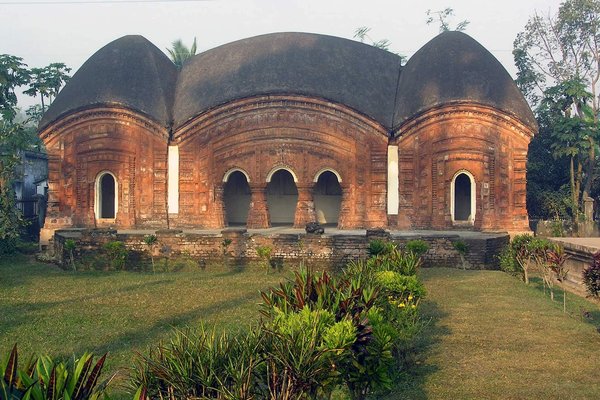Bangladesh
Mughal and Colonial Temples of Bangladesh
The Mughal and Colonial Temples of Bangladesh are 29 Hindu and Buddhist monuments. They were inspired by the Kalinga style of temple architecture and built of brick or stone with terracotta plaques. Many of the included temples are living religious monuments.
Site Info
Official Information
- Full Name
- Mughal and Colonial Temples of Bangladesh (ID: 6673)
- Country
- Bangladesh
- Status
-
On tentative list 2023
Site history
History of Mughal and Colonial Temples of Bangladesh
- 2023: Added to Tentative List
- Added to tentative list
- Type
- Cultural
- Criteria
Links
- UNESCO
- whc.unesco.org
All Links
UNESCO.org
- whc.unesco.org — whc.unesco.org
Community Information
- Community Category
- Archaeological site: South (East) Asian
Travel Information
Recent Connections
News
No news.
Recent Visitors
Visitors of Mughal and Colonial Temples of Bangladesh
Community Reviews
Show full reviewsEls Slots
Mughal and Colonial Temples of Bangladesh
Mughal and Colonial Temples of Bangladesh (On tentative list)

In my Profile section on this website, I’ve had ‘Puthia’ for a long time as one of my proposals for a new WHS. To my surprise, several monuments in Puthia were added to the Bangladeshi Tentative List last month as part of the ‘Mughal and Colonial Temples of Bangladesh’. So let me be the first to review it.
This serial site has 29 locations, of which I visited about nine during my Bangladesh trip in late December 2006 / early January 2007: one in Kantanagar and the others in Puthia (although I did not note down all their names, I've probably seen all in the cluster there). The proposal considers Hindu and Buddhist monuments that were built during the Mughal period in the 16th-19th centuries.
The Hindu temple in Kantanagar (Kantajee Temple, top left and top right photo) lies just outside Dinajpur and can be visited on foot from there. First you walk across a long, springy bamboo bridge (only to be used outside the rainy season). Then through a village with mud huts and a remarkable amount of cattle around the houses: cows, goats, oxen, chickens. And a wealth of crops: potatoes, peppers, and bananas. You can also see the production of jute here, made from flowering plants, which was once Bangladesh's largest export product but has now been supplanted worldwide by plastic.
Arriving at the temple, you first have to go through a gate, and then suddenly there is a beautiful, brick-red Hindu …
Keep reading 0 comments
